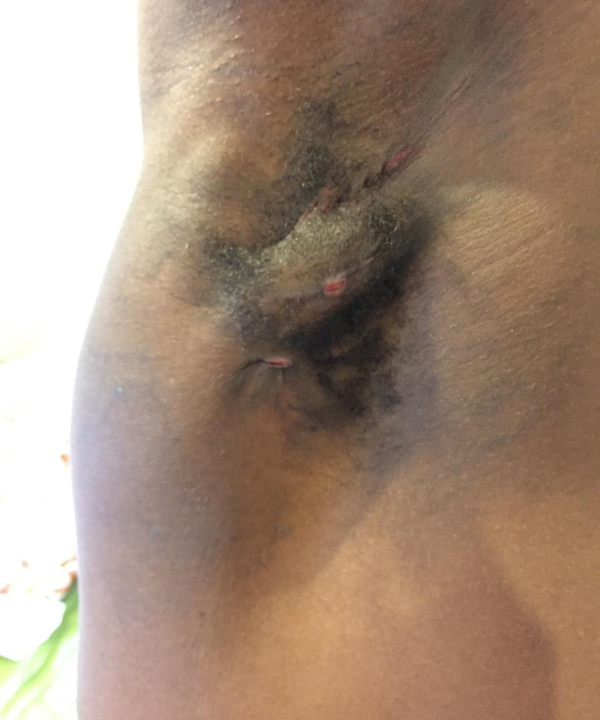Boxer's agonising skin condition 'cured by a skin graft from his backside'

A professional boxer has opened about an agonising skin condition he endured for years.
Jonathan Kumuteo, 24, from London, developed a mysterious abscess under his right arm in early 2015.
The “very, very painful” boil-like lumps would often burst, leaking blood and pus.
When an abscess appeared on Kumuteo’s left armpit, loved ones suggested he may not be “as hygienic as he should be”, with the ordeal “impacting his mental health immensely”.
Read more: People with hidradenitis suppurativa share advice they wish they’d heard
Nearly two years after the first abscess appeared, Kumuteo was diagnosed with hidradenitis suppurativa, a painful skin condition that required he take eight antibiotics a day.
With medication failing to help, doctors suggested the then-amateur athlete quit the sport he loved.
Refusing to leave boxing behind, Kumuteo sought out a surgeon who was willing to perform a skin graft, using tissue from his backside.
Despite the operation having just a 50/50 chance of success, Kumuteo has been free of the condition since 2018, with the boxer due to make his BT Sport debut in August.

‘My friends said ‘aren’t you washing?’’
Before he was officially diagnosed, Kumuteo had his first abscess drained in mid-2015.
“Then I was left with a 4cm (1.5 inch) hole in my underarm that had to be dressed every day in hospital for six weeks,” Kumuteo told Yahoo UK.
“I recovered reasonably quick, but the scar would tear open. I could be sleeping or in the shower. It would bleed for a bit then close.”
While training in 2016, Kumuteo felt tell-tale swelling under his arms.
Read more: Ten ways to make life with hidradenitis suppurativa easier
“I started to get repeated abscesses,” he said.
With no set diagnosis, Kumuteo was eventually told he had hidradenitis suppurativa in late 2016.
Painful lumps are typically a sign of infection, so doctors initially prescribed multiple antibiotics to try to ease Kumuteo’s discomfort.
While these helped somewhat, the abscesses would still rupture.
With the boils hidden beneath his arms, the boxer did not always get sympathy from his loved ones.
“Because it was not visible, my friends struggled to understand what I was going through,” he said.
“My friends and family responded with, ‘maybe you’re not as hygienic as you should be’. They’d say, ‘oh aren’t you washing?’”
In October 2016, Kumuteo won the Senior London ABA Novice Championships with a dressing on his underarm.
A few weeks later, he lost in the national semi-finals, with his coach telling him to rest for a few weeks.
With the skin on his armpits feeling “really weak”, Kumuteo “knew he needed another operation”.
Read more: The challenges I face at work with hidradenitis suppurativa
In January 2017, doctors removed damaged tissue from the area.
“That was very tough because it took me eight months to recover; no sport, I couldn’t work,” said Kumuteo.
“The skin on my underarms was very weak. The scars would tear open.
“I had to wear dressings 24/7 because my clothes and bedding were getting damaged.”
Doctors eventually gave Kumuteo the green light to start training again.
“My first session back in the gym I couldn’t do 10 reps of the bench bar,” he said. “The first time I ever stepped in a gym I could do more than that.”
Although Kumuteo gradually rebuilt his strength, his hidradenitis suppurativa persevered.

‘Giving up boxing was never an option’
While competing as an amateur in 2018, Kumuteo lost a fight against a boxer he had previously beaten.
“I knew I could beat him if I was healthy,” he said.
After seeing another dermatologist, Kumuteo was given three options.
“I could have a jab to my stomach weekly to suppress the hidradenitis suppurativa, but I’d be aching so couldn’t compete,” he said.
In very severe cases, immunosuppressant treatments are injected at “regular intervals”.
Alternatively, Kumuteo was told he could start taking the acne medication Roaccutane, which is notorious for its serious side effects, including suicidal thoughts.
“That would dry out my system, but I couldn’t compete because it’d be too painful,” said Kumuteo.
Finally, he was told he could see a cosmetic surgeon at the Royal Free Hospital in London who specialised in hidradenitis suppurativa.
After meeting with the specialist in September 2018, Kumuteo was offered a skin graft to his armpits and groin, which was also affected.
He went under the knife on 8 November and had recovered within 12 weeks.
“I haven’t had any issues since,” said Kumuteo.
He said that specialist was the “only doctor that gave me hope”.
“Giving up boxing was never an option for me,” said Kumuteo. “But every dermatologist told me I can’t compete because hidradenitis suppurativa is a chronic skin disease and there’s no cure.
“They told me ‘[you] couldn’t compete at the top level the way you are’.”
Kumuteo is training for his BT Sport debut, which should take place in August, coronavirus permitting.
He is speaking out to inspire other hidradenitis suppurativa sufferers “not to give up”.
What is hidradenitis suppurativa?
Hidradenitis suppurativa is a painful, long term skin condition that can cause abscesses or scarring.
It is thought to affect 1% of the UK and US population.
Hidradenitis suppurativa’s exact cause is unclear, however, it tends to impact smokers and obese people.
Women are more likely to suffer, with most coming down with the condition around puberty.
Many patients also have acne or excessive hair growth.
Hidradenitis suppurativa tends to arise near hair follicles with sweat glands, like on the groin, bottom, breasts or armpits.
It usually appears as a firm pea-sized lump in one place. This disappears or ruptures, oozing pus, within a few hours or days.
New lumps often develop in nearby areas, which may spread.
Some become infected with bacteria, requiring antibiotics.
Diagnosis tends to involve a doctor inspecting the skin and possibly swabbing for bacteria.
As well as antibiotics, patients may be prescribed antiseptic washes or vitamin-A based drugs.
A woman might be offered contraceptives if flare-ups occur around her period.
In severe cases, steroids or surgery may be required.


